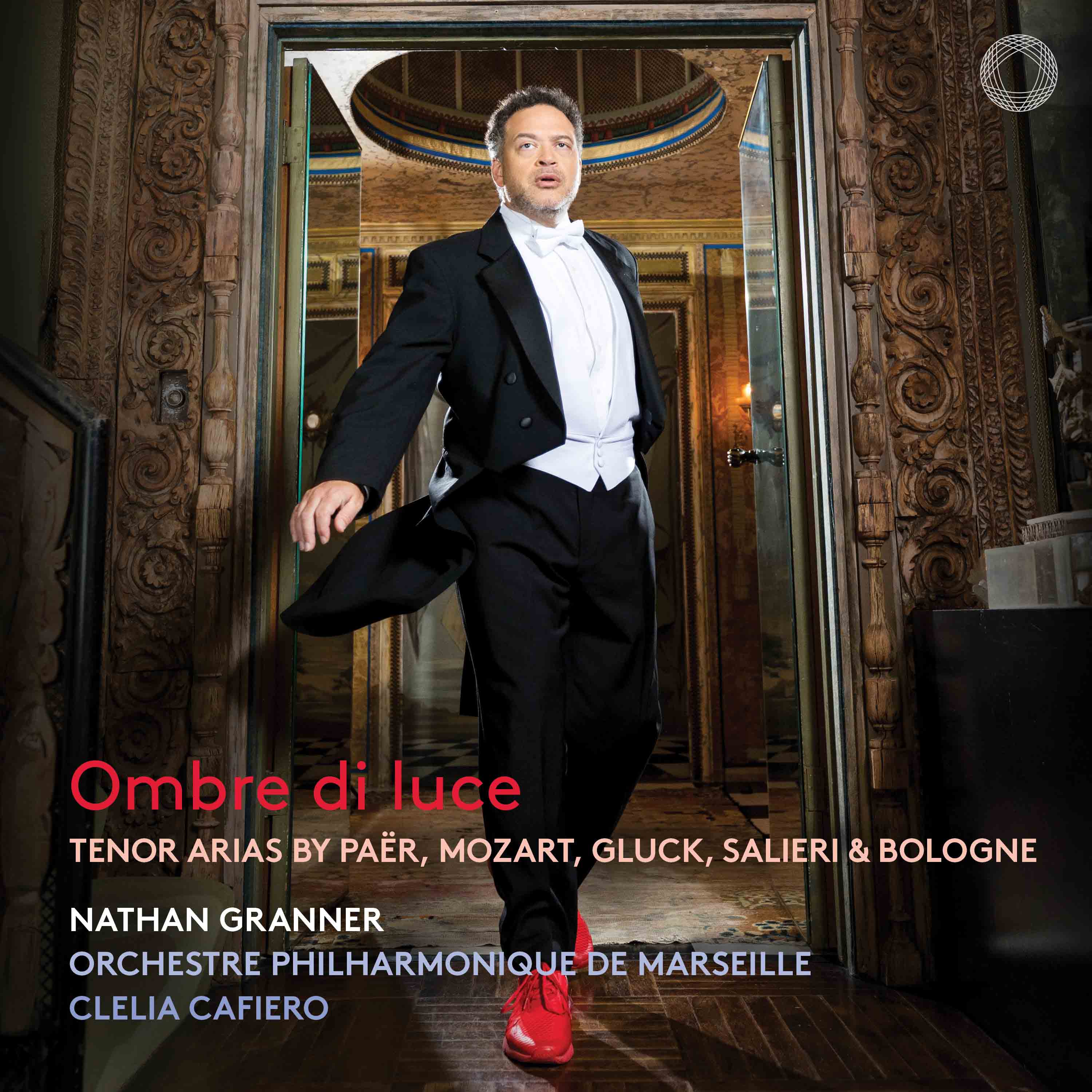Nathan Granner: Ombre di luce
View record and artist detailsRecord and Artist Details
Genre:
Opera
Label: Pentatone
Magazine Review Date: 12/2024
Media Format: Super Audio CD
Media Runtime: 67
Mastering:
DDD
Catalogue Number: PTC5187 209

Tracks:
| Composition | Artist Credit |
|---|---|
| L’amant anonyme, Movement: Depuis longtemps |
Joseph Bologne, Composer
Clelia Cafiero, Conductor Marseille Philharmonic Orchestra Nathan Granner, Tenor |
| Iphigénie en Tauride, Movement: ~ |
Christoph Gluck, Composer
Clelia Cafiero, Conductor Marseille Philharmonic Orchestra Nathan Granner, Tenor |
| Orphée et Eurydice, Movement: J'ai perdu mon Eurydice |
Christoph Gluck, Composer
Clelia Cafiero, Conductor Marseille Philharmonic Orchestra Nathan Granner, Tenor |
| Orphée et Eurydice, Movement: Quel nouveau ciel pour ces lieux |
Christoph Gluck, Composer
Clelia Cafiero, Conductor Marseille Philharmonic Orchestra Nathan Granner, Tenor |
| Così fan tutte, Movement: ~ |
Wolfgang Amadeus Mozart, Composer
Clelia Cafiero, Conductor Marseille Philharmonic Orchestra Nathan Granner, Tenor |
| Don Giovanni, Movement: Il mio tesoro |
Wolfgang Amadeus Mozart, Composer
Clelia Cafiero, Conductor Marseille Philharmonic Orchestra Nathan Granner, Tenor |
| (Die) Entführung aus dem Serail, '(The) Abduction from the Seraglio', Movement: Konstanze...O wie ängstlich |
Wolfgang Amadeus Mozart, Composer
Clelia Cafiero, Conductor Marseille Philharmonic Orchestra Nathan Granner, Tenor |
| Idomeneo, Re di Creta, 'Idomeneo, King of Crete', Movement: ~ |
Wolfgang Amadeus Mozart, Composer
Clelia Cafiero, Conductor Marseille Philharmonic Orchestra Nathan Granner, Tenor |
| Idomeneo, Re di Creta, 'Idomeneo, King of Crete', Movement: Torna la pace al core |
Wolfgang Amadeus Mozart, Composer
Clelia Cafiero, Conductor Marseille Philharmonic Orchestra Nathan Granner, Tenor |
| Mitridate, Re di Ponto, Movement: Se di lauri il crine adorno |
Wolfgang Amadeus Mozart, Composer
Clelia Cafiero, Conductor Marseille Philharmonic Orchestra Nathan Granner, Tenor |
| Mitridate, Re di Ponto, Movement: Vado incontro al fato estremo |
Wolfgang Amadeus Mozart, Composer
Clelia Cafiero, Conductor Marseille Philharmonic Orchestra Nathan Granner, Tenor |
| Misero! o sogno ... Aura, che intorno spiri |
Wolfgang Amadeus Mozart, Composer
Clelia Cafiero, Conductor Marseille Philharmonic Orchestra Nathan Granner, Tenor |
| Leonora, Movement: Dolce oggetto del mio amore … Deh che ciglio rasserena |
Ferdinando Paer, Composer
Clelia Cafiero, Conductor Marseille Philharmonic Orchestra Nathan Granner, Tenor |
| (Les) Danaides, Movement: Rends-moi ton coeur |
Antonio Salieri, Composer
Clelia Cafiero, Conductor Marseille Philharmonic Orchestra Nathan Granner, Tenor |
Author: Richard Lawrence
Nathan Granner is an American singer in his 40s who has made a career, to quote his website, as ‘a leading tenor, headliner, solo, and collaborative artist specialising in Contemporary Opera and late bel canto repertoire’. In ‘Ombre di luce’, translated as ‘Shadows in Light’, he treads a different path: it’s an excellently varied selection of arias reflecting the increasing importance of the tenor voice in opera during the course of the 18th century.
Granner starts with a real rarity: an extended aria in two parts for Florestano, the imprisoned hero of Paër’s Leonora (1804, a year before Beethoven’s setting of the story). The Orchestre Philharmonique de Marseille, with braying horns, and solos for violin and viola, are admirable here; elsewhere they are inclined to be on the heavy side. Granner is fluent in the coloratura towards the end and equally accomplished in Don Ottavio’s ‘Il mio tesoro’ from Don Giovanni, which makes it all the more surprising that he chooses the simplified version of Idomeneo’s ‘Fuor del mar’. Both ‘Torna la pace’ and ‘Il mio tesoro’ show off his impressive breath control.
The Gluck excerpts come off well. ‘J’ai perdu mon Eurydice’ (aka ‘Che farò’) is a difficult one to get across: at the tempo set by Clelia Cafiero it sounds too jaunty. But ‘Quel nouveau ciel’, where Orpheus expresses his wonder at the beauty of the Elysian Fields, is nicely done, as is Pylades welcoming death with his bosom friend Orestes in Iphigénie en Tauride. In the two arias from Mozart’s early Mitridate (1770) Granner sounds strained, with some rather wild top Cs in ‘Vado incontro al fate estremo’. But he makes a good fist of the high tessitura in ‘Ah, lo veggio’, Ferrando’s usually (and justly) omitted aria in Così fan tutte.
There’s a touching tenderness in the excerpt from Salieri’s Les Danaïdes; likewise in the all too brief air by Joseph Bologne (better known as the Chevalier de Saint-Georges). The final number is the longest of all, Mozart’s concert aria Misero! O sogno, o son desto?, where Granner portrays the regret and despair of the unnamed character (a prisoner, like Florestano) with a marvellous intensity.
I enjoyed listening to this intelligently chosen sequence. In an informative booklet note Suzanne Aspden cites, without comment, Granner’s view that the wimpish Don Ottavio’s failure to follow up his resolve to avenge the murder of the Commendatore by Don Giovanni is explained by his being a man of the Enlightenment who believes in justice, not revenge: an improbable theory, if ever I heard one!
Discover the world's largest classical music catalogue with Presto Music.

Gramophone Digital Club
- Digital Edition
- Digital Archive
- Reviews Database
- Full website access
From £8.75 / month
Subscribe
Gramophone Full Club
- Print Edition
- Digital Edition
- Digital Archive
- Reviews Database
- Full website access
From £11.00 / month
Subscribe
If you are a library, university or other organisation that would be interested in an institutional subscription to Gramophone please click here for further information.




